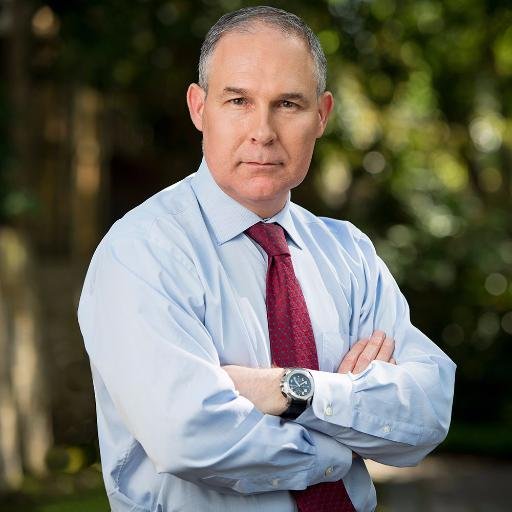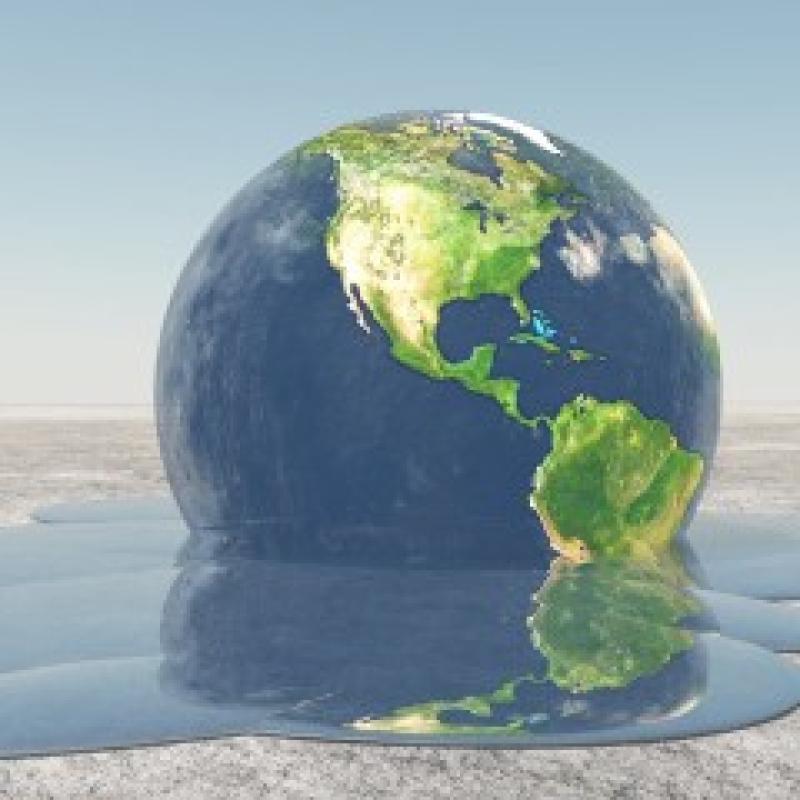Scott Pruitt’s Climate Denial Shines Thru His Senate Answers
 Oklahoma attorney general Scott Pruitt, President Trump’s nominee to run the Environmental Protection Agency, gave evasive answers to hundreds of questions from Senators trying to evaluate his fitness to for the office. On most questions the Environment and Public Works Committee’s ranking Democrat, Senator Tom Carper, said “Pruitt’s answers give us no substance.”
Oklahoma attorney general Scott Pruitt, President Trump’s nominee to run the Environmental Protection Agency, gave evasive answers to hundreds of questions from Senators trying to evaluate his fitness to for the office. On most questions the Environment and Public Works Committee’s ranking Democrat, Senator Tom Carper, said “Pruitt’s answers give us no substance.”
But despite Pruitt’s evasiveness, his true colors shine through in important ways. My colleague John Walke has analyzed Pruitt’s deficient answers on public health standards and conflicts of interest in this post .
Here I look at Pruitt’s revealing answers on climate science. They show his penchant for “alternative facts” over mainstream climate science—specifically, his embrace of thoroughly discredited pseudo-science from the climate denial corners that Pruitt has long inhabited. Scott Pruitt’s fringe views on climate change are disqualifying.
Pruitt’s Active Denial on Climate Science
Pruitt’s principal rote responses to climate science questions allow that the climate is changing but waffle on the significance, the causes, and appropriate remedies. At least five times, Pruitt says this, or words substantially the same:
The climate is changing and human activity impacts our changing climate in some manner. The ability to measure with precision the degree and extent of that impact, and what to do about it, are subject to continuing debate and dialogue.
At least seven times, Pruitt referred to need to continue assessing “the ever-evolving understanding of the impact increasing greenhouse gases have on our changing climate.”
These bland words might have been excusable from an EPA nominee three or four decades ago, but today’s scientific understanding of the impacts, causes, and remedies to climate change is, in fact, far more definitive.
Oregon Senator Jeff Merkley put Pruitt to the test with questions drawn straight from the most recent report of the Intergovernmental Panel on Climate Change, the authoritative international scientific body chartered by governments worldwide to assess the causes and responses to climate change. The specific scientific questions Merkley asked—and Pruitt refused to answer—are worth quoting:
Below is a list of statements from the Intergovernmental Panel on Climate Change’s Fifth Assessment Report. For each statement, please indicate your agreement or disagreement and explain your reasoning:
• “Warming of the climate system is unequivocal.”
• “The atmosphere and ocean have warmed, the amounts of snow and ice have diminished, sea level has risen, and the concentrations of greenhouse gases have increased.”
• “The atmospheric concentrations of carbon dioxide, methane, and nitrous oxide have increased to levels unprecedented in at least the last 800,000 years.”
• “Carbon dioxide concentrations have increased by 40% since pre-industrial times, primarily from fossil fuel emissions and secondarily from net land use change emissions.”
• “The ocean has absorbed about 30% of the emitted anthropogenic carbon dioxide, causing ocean acidification.”
• “The largest contribution to total radiative forcing is caused by the increase in the atmospheric concentration of CO2 since 1750.”
• “It is extremely likely that human influence has been the dominant cause of the observed warming since the mid-20th century.”
• “Continued emissions of greenhouse gases will cause further warming and changes in all components of the climate system.”
• “It is very likely that the Arctic sea ice cover will continue to shrink and thin and that Northern Hemisphere spring snow cover will decrease during the 21st century as global mean surface temperature rises. Global glacier volume will further decrease.”
• “Global mean sea level will continue to rise during the 21st century.... [T]he rate of sea level rise will very likely exceed that observed during 1971 to 2010 due to increased ocean warming and increased loss of mass from glaciers and ice sheets.”
• “Limiting climate change will require substantial and sustained reductions of greenhouse gas emissions.”
Pruitt ignored Merkley’s request to respond to each IPCC statement. Instead, Pruitt gave only this evasive but revealing answer:
There is a diverse range of views regarding the key drivers of our changing climate among scientists. I believe that these differences should be the subject of robust and open debate free from intimidation. If confirmed, I will continue to encourage an honest debate on our changing climate, the role of human activity, our ability to measure the degree and extent of human activity, and what to do about it.
In other words, Scott Pruitt rejects the international scientific consensus, and signals that he will seek out the “diverse” views of fringe climate deniers. He makes this even clearer in his next answer, disputing the clear trend of warming measured over the last three decades:
I am aware of a diverse range of conclusions regarding global temperatures, including that over the past two decades satellite data indicates there has been a leveling off of warming, which some scientists refer to as the “hiatus.” I am also aware that the discrepancy between land-based temperature stations and satellite temperature stations can be attributed to expansive urbanization within in our country where artificial substances such as asphalt can interfere with the accuracy of land-based temperature stations and that the agencies charged with keeping the data do not accurately account for this type of interference. I am also aware that ‘warmest year ever’ claims from NASA and NOAA are based on minimal temperature differences that fall within the margin of error. Finally, I am aware that temperatures have been changing for millions of years that predate the relatively short modern record keeping efforts that began in 1880.
These sentences reveal Pruitt’s embrace of discredited “alternative facts.” NOAA scientists recently put the last nail in the coffin of the false claim of a warming “hiatus.” Scientists have also long since resolved the alleged discrepancy between land- and satellite-based temperature measurements—even John Christy, the scientist who originally raised the question now agrees that the two sources of data are consistent and both show a clear warming trend. And NASA’s and NOAA’s “warmest year ever” conclusions are, in fact, solid and robust and are backed up by the British Meteorological Office, the World Meteorological Organizations, and other scientific authorities.
Pruitt’s last sentence is especially interesting. Temperatures have indeed changed over millions of years. Far from a reason to relax, that should be a cause of great concern, because it shows the climate is sensitive to forcing factors, including changes in atmospheric levels of greenhouse gases. Whatever the causes of changes in the levels of such gases in the past, it is industrial-age pollution that is driving the current rapid buildup of CO2 and other heat-trapping gases, and causing global temperatures to rise.
Pruitt’s Long Opposition to EPA’s “Endangerment Finding”
Pruitt was a charter member of the anti-EPA coalition of state attorneys general, coal interests, and right-wing legal groups that sued to overturn the “ endangerment determination ,” the agency’s science-based finding, articulated in 2009 and strengthened several times since, that rising atmospheric levels of CO2 and five other heat-trapping air pollutants endanger public and welfare.
Pruitt and his allies launched a barrage of challenges, including bogus scientific contentions resembling the ones he provided above. The Court of Appeals for the D.C. Circuit, however, forcefully rejected those claims, upholding the endangerment finding in Coalition for Responsible Regulation v. EPA in 2012 . Pruitt’s coalition appealed to Supreme Court, but the high court saw nothing in the endangerment ruling worthy of review.
This was no academic squabble about a scientific finding. As a legal matter, the endangerment determination requires EPA to follow up with action under the Clean Air Act to curb emissions from vehicles, power plants, and other sources. That is what the Supreme Court decided in the landmark 2007 decision, Massachusetts v. EPA . If Pruitt had succeeded in his challenge to the finding, however, EPA would not have been obligated to act. Thankfully, he failed.
Alarmingly, however, Pruitt’s Senate answers leave the door open to revoke the endangerment determination once he is confirmed. Asked several times whether he will commit not to tamper with that finding, Pruitt carefully responded:
To my knowledge, there is nothing currently pending before the EPA that would require I take any additional actions on the Endangerment Finding on Greenhouse Gases and if there were, it would not be wise to prejudge the outcome.
Watch out. Put his answers together, and Pruitt is virtually inviting a new petition to revoke the endangerment finding based on fringe science like what he included in his Senate answers. He’ll enforce EPA’s finding, he promises, unless he changes it.
Pruitt’s Fringe Views on Climate Science Are Disqualifying
Scott Pruitt’s unwillingness to accept and affirm the basic tenets of climate science, and his eagerness to embrace the fringe, discredited views of climate denialists, are disqualifying. He simply cannot be trusted to carry out his obligations under the Clean Air Act to protect Americans from the dangerous pollution that’s driving climate change.
[ Link to original article ]




